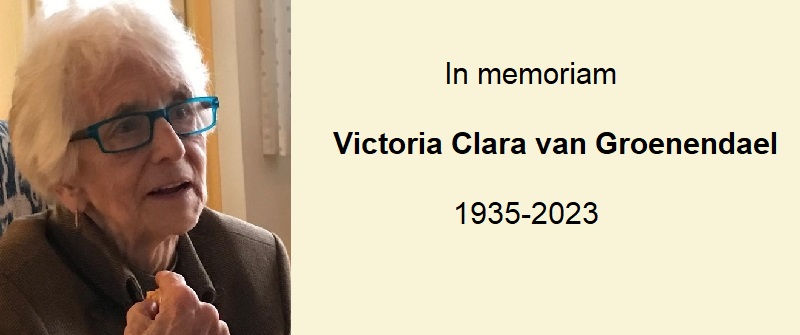
13 Jun In memory of Victoria Clara van Groenendael (1935-2023)
On 3 April 2023, Dr Victoria Clara van Groenendael passed away. In her we have lost a dear friend and colleague.
While Dr van Groenendael’s scholarly work rests on the solid basis of academic training, prior instruction (or rather the lack of it) also left its traces. She hardly attended elementary school, which meant that she never felt at ease with grammar. Even so, she successfully completed secondary school and a teacher training course. Victoria loved her first job as an instructor of deaf children; she even learned to drive a bus so that she could collect the kids from their homes. We recognize in this the enthusiasm and commitment shown in her later career.
Though she enjoyed this work, Victoria was looking for greater intellectual challenges. She decided to go to university, with her mother providing financial support. Victoria chose Social Anthropology because it interested her, and the Vrije Universiteit (VU) in Amsterdam because it was around the corner – combining idealism with pragmatism was her hallmark. She specialized in Javanese shadow theatre and this brought her to Leiden, where she learned Javanese in preparation for her fieldwork in Java. It was from the VU, however, that she obtained her doctoral degree.
Three publications in particular underpin Victoria’s fame as a scholar of Javanese shadow theatre: her PhD thesis on the puppeteer, her bibliography of the literature on Javanese shadow theatre, and her English adaptation of a famous book on popular drama in Java, Pigeaud’s Javaansche Volksvertooningen of 1938. Shadow theatre was to remain the focus of Victoria’s interest but the latter publication, together with a fourth book (on Javanese horse dance), is proof of her expertise beyond the boundaries of her actual specialisation.
The bibliography, published by KITLV in its Bibliographical Series, was the first of its kind. Victoria’s PhD thesis and her adaptation of Pigeaud’s book were not only rich in content but also methodologically innovative.
Working on Pigeaud’s Volksvertooningen, for example, Victoria soon found that it was the product of armchair scholarship, combining local and regional reports into an overview that, despite containing abundant information, completely failed to make clear how it was connected with reality. Finding this high level of abstraction unsatisfactory, she dropped the initial idea of a translation and wrote an adapted version instead. Truth and transparency were more important to her than established fame. Originality was another quality of hers. Javanese shadow theatre studies traditionally focused on narrative and iconographic aspects. In her PhD thesis, Victoria drew attention to the puppeteer. This new perspective was expressed in the title: There is a dalang behind the screen. Equally new was the element of fieldwork – common for a trained anthropologist but revolutionary for students of shadow theatre. Rather than simply conducting armchair research, Victoria would jump on the back of a motorcycle and speed off to watch yet another performance.
Victoria took the trouble to learn Javanese as a living response to a complaint made by her teacher in Leiden: anthropologists tended to take the easy but risky option of using an interpreter for their fieldwork in foreign cultures, rather than learning the language themselves. In Leiden, too, the flattering and completely justified appraisal of Victoria was that she always delivered. Because that is what she did: all the research money she successfully raised resulted in the publications she had promised – and on time. Victoria enjoyed doing what she believed was worth doing, and she did it well.
Willem van der Molen.




No Comments